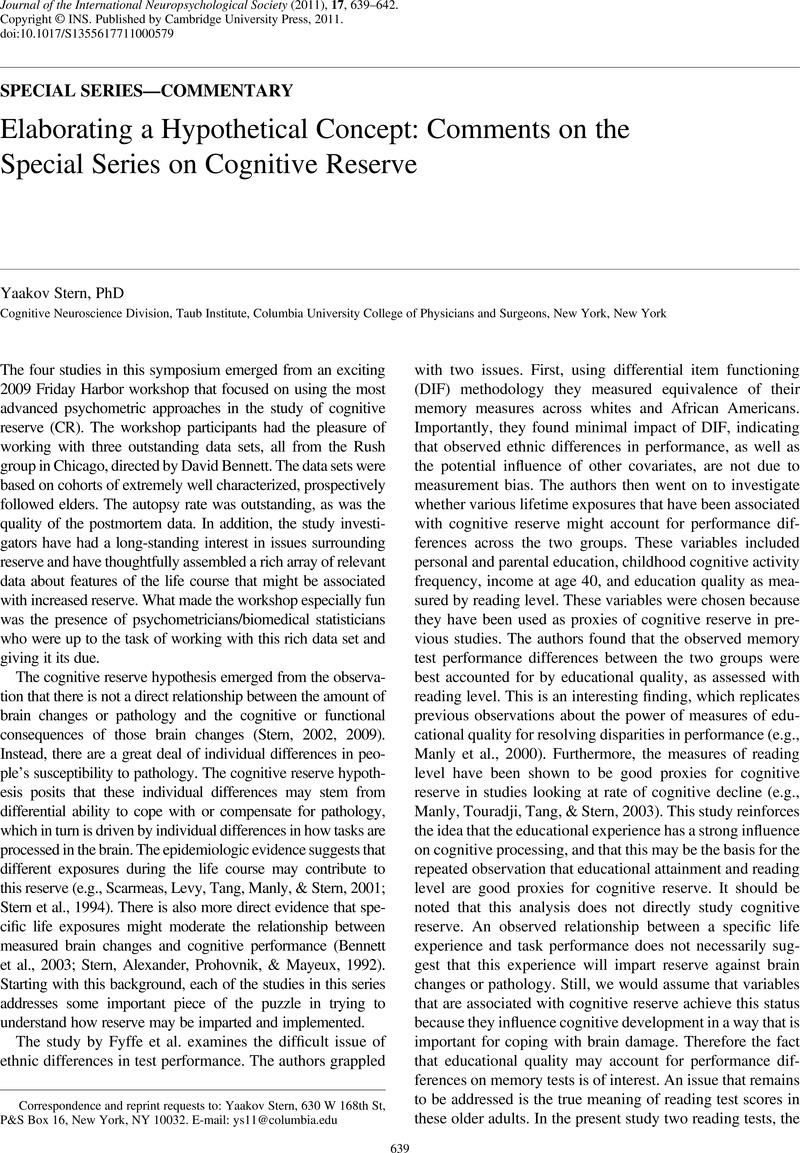Crossref Citations
This article has been cited by the following publications. This list is generated based on data provided by Crossref.
Giogkaraki, Erasmia
Michaelides, Michalis P.
and
Constantinidou, Fofi
2013.
The role of cognitive reserve in cognitive aging: Results from the neurocognitive study on aging.
Journal of Clinical and Experimental Neuropsychology,
Vol. 35,
Issue. 10,
p.
1024.
Soldan, Anja
Pettigrew, Corinne
Li, Shanshan
Wang, Mei-Cheng
Moghekar, Abhay
Selnes, Ola A.
Albert, Marilyn
and
O'Brien, Richard
2013.
Relationship of cognitive reserve and cerebrospinal fluid biomarkers to the emergence of clinical symptoms in preclinical Alzheimer's disease.
Neurobiology of Aging,
Vol. 34,
Issue. 12,
p.
2827.
Constantinidou, Fofi
Zaganas, Ioannis
Papastefanakis, Emmanouil
Kasselimis, Dimitrios
Nidos, Andreas
and
Simos, Panagiotis G
2014.
Age-Related Decline in Verbal Learning Is Moderated by Demographic Factors, Working Memory Capacity, and Presence of Amnestic Mild Cognitive Impairment.
Journal of the International Neuropsychological Society,
Vol. 20,
Issue. 8,
p.
822.
Harezlak, J.
Cohen, R.
Gongvatana, A.
Taylor, M.
Buchthal, S.
Schifitto, G.
Zhong, J.
Daar, E. S.
Alger, J. R.
Brown, M.
Singer, E. J.
Campbell, T. B.
McMahon, D.
So, Y. T.
Yiannoutsos, C. T.
and
Navia, B. A.
2014.
Predictors of CNS injury as measured by proton magnetic resonance spectroscopy in the setting of chronic HIV infection and CART.
Journal of NeuroVirology,
Vol. 20,
Issue. 3,
p.
294.
Tromp, D.
Dufour, A.
Lithfous, S.
Pebayle, T.
and
Després, O.
2015.
Episodic memory in normal aging and Alzheimer disease: Insights from imaging and behavioral studies.
Ageing Research Reviews,
Vol. 24,
Issue. ,
p.
232.
Rodríguez-Angarita, Calos E.
2017.
Mantenimiento y conservación de la memoria en un grupo de ancianos.
Repertorio de Medicina y Cirugía,
Vol. 26,
Issue. 4,
p.
219.
Opdebeeck, C.
Matthews, F. E.
Wu, Y-T.
Woods, R. T.
Brayne, C.
and
Clare, L.
2018.
Cognitive reserve as a moderator of the negative association between mood and cognition: evidence from a population-representative cohort.
Psychological Medicine,
Vol. 48,
Issue. 1,
p.
61.
Mahoney, James J.
Bryant, Kirk R.
and
Haut, Marc W.
2019.
Handbook of Medical Neuropsychology.
p.
697.
Smith, Patrick J.
Okonkwo, Ozioma
and
van Praag, Henriette
2019.
Pathways of Prevention: A Scoping Review of Dietary and Exercise Interventions for Neurocognition.
Brain Plasticity,
Vol. 5,
Issue. 1,
p.
3.
Pestana, Maria Helena
and
Sobral, Margarida
2019.
Cognitive reserve and dementia A scientometric review.
Dementia & Neuropsychologia,
Vol. 13,
Issue. 1,
p.
1.
Krzemien, Deisy
Miranda, Claudia
and
Martin, Noelia Giselle
2020.
La ocupación en la Gerontología: una perspectiva crítica del Modelo de Ocupación Humana.
Revista Ocupación Humana,
Vol. 20,
Issue. 1,
p.
82.
Chen, L.
and
Lu, B.
2020.
Cognitive reserve regulates the association between hearing difficulties and incident cognitive impairment evidence from a longitudinal study in China.
International Psychogeriatrics,
Vol. 32,
Issue. 5,
p.
635.
Ramos, Jairo
Chowdhury, Aneesa R.
Caywood, Laura J.
Prough, Michael
Denise Fuzzell, M.
Fuzzell, Sarada
Miskimen, Kristy
Whitehead, Patrice L.
Adams, Larry D.
Laux, Renee
Song, Yeunjoo
Ogrocki, Paula
Lerner, Alan J.
Vance, Jeffery M.
Haines, Jonathan L.
Scott, William K.
Pericak-Vance, Margaret A.
and
Cuccaro, Michael L.
2021.
Lower Levels of Education Are Associated with Cognitive Impairment in the Old Order Amish.
Journal of Alzheimer's Disease,
Vol. 79,
Issue. 1,
p.
451.
Cañete-Massé, Cristina
Carbó-Carreté, Maria
Figueroa-Jiménez, María Dolores
Oviedo, Guillermo R.
Guerra-Balic, Myriam
Javierre, Casimiro
Peró-Cebollero, Maribel
and
Guàrdia-Olmos, Joan
2022.
Confirmatory factor analysis with missing data in a small sample: cognitive reserve in people with Down Syndrome.
Quality & Quantity,
Vol. 56,
Issue. 5,
p.
3363.
Rodriguez, Miriam J.
Burke, Shanna
Padron, Dilliana
Duarte, Andres
Rosselli, Monica
Grieg-Custo, Maria
Grudzien, Adrienne
Loewenstein, David A.
and
Duara, Ranjan
2022.
Associations Between Country where Education is Obtained and Cognitive Functioning Among South American and Caribbean Older Adults Living in the U.S.
Journal of Cross-Cultural Gerontology,
Vol. 37,
Issue. 3,
p.
257.
Woo, Young Sup
Lee, Kyoung-Uk
Hahn, Changtae
McIntyre, Roger S.
Teopiz, Kayla M.
and
Bahk, Won-Myong
2024.
Psychometric Properties of the Korean Version of THINC-integrated Tool (THINC-it-K): A Tool for Screening Assessment of Cognitive Function in Patients with Major Depressive Disorder.
Clinical Psychopharmacology and Neuroscience,
Vol. 22,
Issue. 3,
p.
458.



